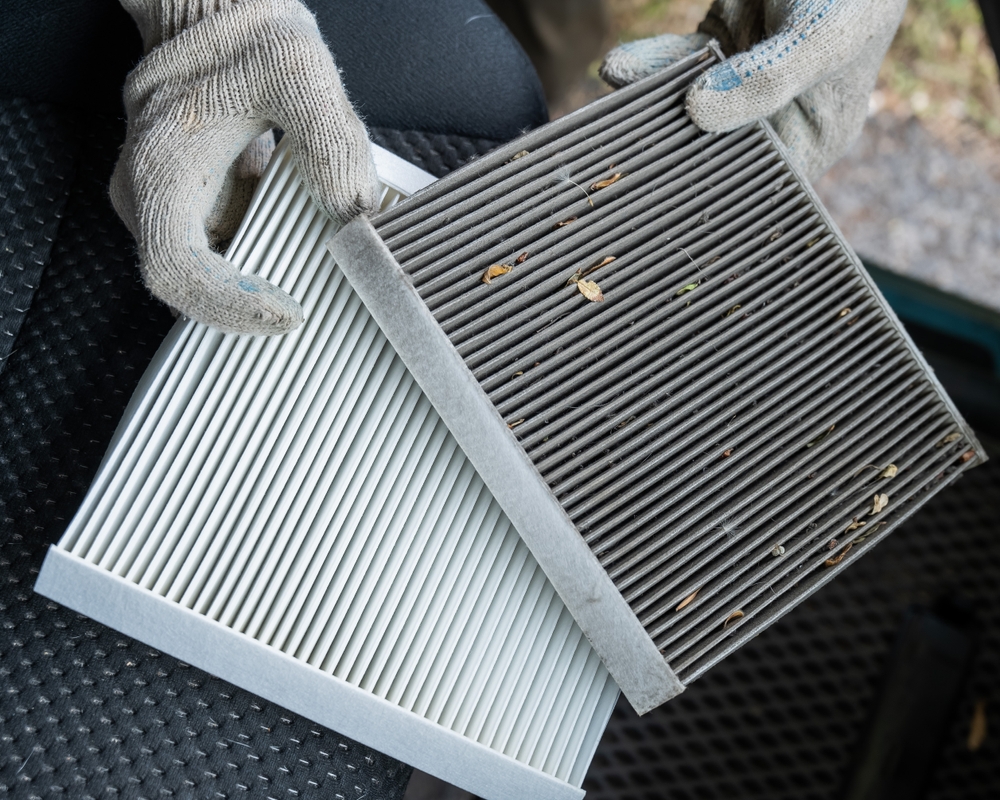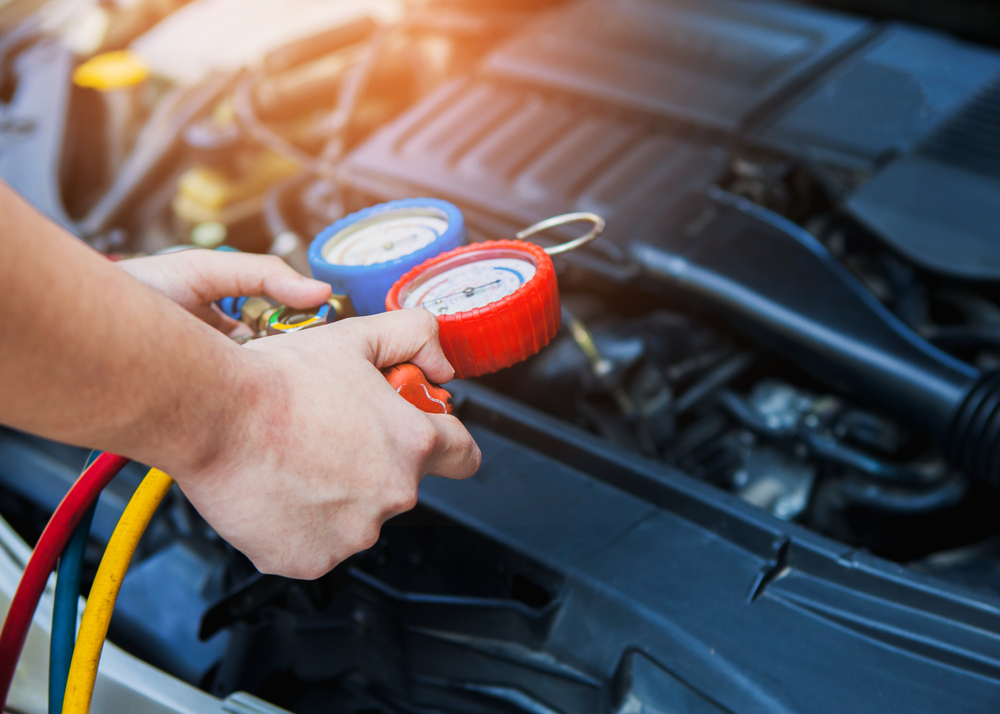Picture this: you’re cruising down Independence Boulevard on a sweltering 92°F Charlotte afternoon, and suddenly your Nissan’s air conditioning decides to quit on you. Instead of that refreshing cool breeze, you’re getting nothing but hot air blasting from your vents. It’s frustrating, uncomfortable, and frankly dangerous during Charlotte’s notorious summer heat waves when temperatures regularly climb above 90°F with humidity that makes it feel even worse.
The good news? Many AC problems have straightforward explanations, and some even have simple fixes you can try before heading to the shop. Whether you’re dealing with a quick DIY solution or need professional help, understanding what’s happening under the hood can save you time, money, and a lot of sweaty discomfort during those long Charlotte commutes. Let’s walk through exactly what might be causing your Nissan to blow hot air and how to get back to comfortable driving.
Is It Just a Simple Fix? What to Check First
Before you panic about expensive repairs, let’s start with the most common culprits that are surprisingly easy to address. Your cabin air filter—that often-forgotten component tucked away behind your glove compartment—might just be the villain here. A clogged filter restricts airflow significantly, making your AC work much harder while delivering disappointing results. If you haven’t replaced yours in the past 12 months (or sooner in Charlotte’s pollen-heavy spring season), this could easily be your problem.
Simply removing and inspecting your cabin air filter takes about five minutes and immediately tells you a lot. A clean filter should look relatively white or light-colored, while a clogged one appears dark, dirty, or even packed with Charlotte’s infamous spring pollen. Replacing it typically costs under $20 if you do it on your own, and instantly improves airflow, potentially solving your hot air problem right away. Plus, you’ll notice your vents blow more powerfully, and any musty odors will likely disappear as well.
Next, check your basics: ensure your temperature dial is actually set to cool (not heat), your fan speed is appropriately high, and your AC button is genuinely engaged. These sound obvious, but digital climate controls can sometimes be confusing, especially if someone else recently drove your Nissan. Also, take a moment to visually inspect your vents—make sure nothing is blocking them and that all vent doors are open properly, allowing maximum airflow throughout your cabin.
Common Nissan AC Problems That Require a Professional
When simple fixes don’t resolve your hot air problem, you’re likely dealing with more complex issues that require expert diagnosis and professional repair. Schedule a service appointment if you suspect any of these common Nissan AC problems.
Low refrigerant levels represent one of the most frequent causes of AC systems blowing hot air. Even though your AC system is designed as a “closed system,” small leaks can develop over time due to normal wear, vibrations, and Charlotte’s temperature extremes. When refrigerant levels drop, your compressor can’t effectively circulate the coolant needed to produce cold air. This issue requires professional attention because technicians need specialized equipment to properly recharge your system and identify leak sources.
Compressor failure poses another significant concern, particularly in older Nissan models. The compressor essentially acts as your AC system’s heart, circulating refrigerant throughout the entire system. When it fails, you’ll often hear unusual noises during AC operation—grinding, squealing, or clicking sounds that definitely weren’t there before. A failing compressor can’t effectively pressurize the refrigerant, resulting in hot or lukewarm air from your vents regardless of your temperature settings.
Evaporator temperature sensor problems frequently plague certain Nissan models, especially 2009–2016 Versas, Rogues, and Altimas. This sensor monitors the evaporator’s temperature to prevent it from freezing up, but when it malfunctions, it sends incorrect readings to your AC control unit. The system then mistakenly thinks the evaporator is frozen and shuts down the compressor, leaving you with hot air. This problem is particularly tricky because the issue appears intermittent—your AC might work perfectly for an hour, then suddenly stop cooling, making diagnosis challenging without professional equipment.
| Problem | Symptoms | Common in Models | Professional Solution Needed |
|---|---|---|---|
| Low Refrigerant | Gradually decreasing cold air, warm air at idle | All Nissan models after 80k+ miles | Leak detection, recharge, seal replacement |
| Compressor Failure | Grinding noises, no cold air, visible leaks | High-mileage Altimas, Sentras | Compressor replacement, system flush |
| Evaporator Sensor | Intermittent cooling, works when moving | 2009-2016 Versas, Rogues | Sensor replacement, system recalibration |
| Condenser Problems | Hot air, especially at idle or in traffic | All models, especially city-driven | Condenser cleaning or replacement |
Why You Shouldn’t Ignore a Failing AC System
Ignoring AC problems might seem like a reasonable way to save money, especially during Charlotte’s milder winter months, but this approach often backfires spectacularly. AC systems are interconnected, meaning one failing component frequently damages others, turning a moderate repair bill into a major expense. For example, a small refrigerant leak that goes unaddressed can cause your compressor to run dry, leading to catastrophic compressor failure that requires replacing multiple system components.
Beyond the financial implications, a non-functioning AC system poses genuine safety concerns during Charlotte’s intense summer heat. When interior temperatures climb above 100°F, driver fatigue sets in quickly, concentration diminishes noticeably, and reaction times slow down measurably. This becomes particularly dangerous during rush hour traffic on I-485 or when you’re stuck in construction delays on I-77, where temperatures inside your car can become genuinely hazardous.
Your AC system also controls cabin humidity levels, not just temperature. Without proper dehumidification, windows fog up more easily during Charlotte’s frequent summer thunderstorms, creating visibility issues that significantly compromise driving safety. Additionally, excessive humidity promotes mold and mildew growth inside your vehicle, leading to unpleasant odors and potential health concerns for passengers with allergies or respiratory sensitivities. Regular tire services can also help maintain optimal driving conditions when your AC isn’t functioning properly.
Frequently Asked Questions About Nissan AC Service
Q: What is a car AC “recharge,” and does my Nissan need one?
A: An AC recharge involves adding refrigerant to your system to restore proper cooling levels. Your Nissan might need one if you notice gradually decreasing cold air or if your AC only works well while driving but struggles at idle. However, simply adding refrigerant without finding and fixing leaks is a temporary solution at best.
Q: How much does it cost to fix a car AC in Charlotte?
A: AC repair costs vary significantly depending on the problem’s complexity. Simple issues like cabin filter replacement or refrigerant recharges are quite affordable, while compressor replacement or evaporator work involves more substantial investment. Our technicians always provide detailed estimates before beginning any work, and we’ll check for our latest service specials to help reduce your costs.
Q: Can I drive my Nissan if the AC is blowing hot air?
A: You can drive with a non-functioning AC, but it’s not recommended during Charlotte’s summer heat. Interior temperatures can become dangerous, affecting your concentration and reaction time. If you must drive, take frequent breaks, stay hydrated, and avoid peak heat hours when possible.
Q: How long does a typical AC repair take?
A: Simple repairs like filter replacement or refrigerant recharge can often be completed within an hour. More complex issues, such as compressor replacement or evaporator sensor work, typically require a full day or longer. We’ll provide accurate time estimates when you schedule your service and keep you updated throughout the repair process.
Q: Is my Nissan’s AC problem covered under warranty?
A: Warranty coverage depends on your vehicle’s age, mileage, and the specific problem. Some AC components may be covered under your Nissan’s basic warranty, while others might fall under powertrain coverage. Our service advisors can quickly check your warranty status and explain what’s covered before any work begins.
Schedule Your Nissan AC Service Today
Don’t let a failing AC system ruin your drives around Charlotte and the greater Queen City area. The factory-trained experts at East Charlotte Nissan Service are here to get your cool air flowing again, whether you drive a brand-new Nissan Rogue or a trusted Altima that’s been serving you reliably for years. We have the right diagnostic tools, Genuine Nissan Parts, and specialized knowledge to handle any AC issue efficiently and effectively.
With Charlotte’s summer temperatures regularly reaching the mid-90s and humidity making it feel even hotter, waiting to address AC problems only makes the situation worse and potentially more expensive to fix. Our comprehensive diagnostic approach identifies exactly what your system needs, ensuring you get appropriate service that solves the problem rather than just temporary fixes that fail when you need cooling most.
Click here to schedule your AC diagnostic and get back to comfortable driving!
Or visit us at 6901 E Independence Blvd, Charlotte, NC 28227, and let our certified Nissan technicians ensure your air conditioning keeps you cool throughout North Carolina’s demanding summer weather.




